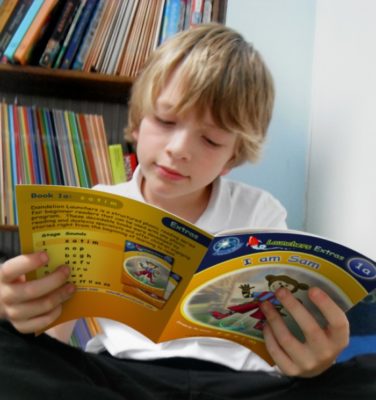In the latest blog post in this series, Guest blogger, Faith Borkowsky discusses her observations and recommendations for any school district considering the transition to a Science of Reading based instruction practice. The importance of choosing a science-based reading program that is coupled with high quality, carefully aligned decodable books and resources and backed with unwavering support from administrators and senior leadership down to the implementation by teachers, has been key to its success.
Teachers across the United States are just beginning to embrace research on how to best teach reading. It is not easy, however, to overcome decades of indoctrination and belief that quality reading instruction boils down to exposing children to books, surrounding them with word walls, and reciting the alphabet song. Even when teachers know about evidence-based practices, they still may not be permitted to adopt such practices in the classroom.
As I have previously discussed, I have had the honor this past school year of acting as district literacy consultant for the Lynbrook School District on Long Island, which took the brave step of completely revamping its Tier 1 reading instruction to align with evidence-based practices, starting with the district’s Kindergarten Center. I am thrilled to announce that Lynbrook’s initiative has been a great success thus far! I have witnessed a successful implementation of science-based reading instruction utilizing a linguistic phonics program, Sounds-Write, supported and supplemented by readily available Phonic Books decodable readers.

None of this would be possible without the full commitment of Lynbrook’s administrators, who completely bought in from the start and facilitated and supported their teachers’ efforts to learn about the Science of Reading and train in the Sounds-Write program. Any early skepticism among the Kindergarten Center teachers quickly dissipated as they observed their students’ literacy skills growing by leaps and bounds over prior years’ classes.
Below are some observations and recommendations for other school districts considering a transition to science-based reading instruction:
District Leadership
When I first came on board at Lynbrook, the Assistant Superintendent of Curriculum and Instruction, Dr. Gerard Beleckas, invited me to meet with the Superintendent, Dr. Melissa Burak, the kindergarten and elementary school Principals, and a diverse group of teachers, via Zoom, to give a short presentation and answer questions about why instructional change was needed. Eventually, I met with Dr. Burak in person to share research and build rapport. We then planned workshops for the summer to prepare all kindergarten and first-grade teachers for the changes. We introduced science-based concepts and built up their knowledge so they would be comfortable when starting the formal Sounds-Write training. These steps created momentum and a context for new learning, which smoothed the way for the paradigm shift the district was undertaking.
Once the school year began, Dr. Beleckas made sure to give the affected teachers classroom coverage while they took the online training course, or he compensated them for their training time outside of school hours. Every step of the way, Dr. Beleckas kept his word and supported this implementation. Every classroom was provided with dry erase boards and markers for each child, and new classroom libraries were filled with decodable books and any other supplies to help the teachers. As I said in a previous blog, Dr. Beleckas even did the training himself, further demonstrating his commitment.
Building Leadership
I visited the Kindergarten Center weekly to provide support and guidance to the teachers. The Center’s Principal, Ellen Postman, would clear her calendar on those days, making it a priority to accompany me on the walkthroughs. I always felt that Ms. Postman and I were a team, and the teachers saw a mutual respect when we walked into the classrooms. She did not micro-manage, yet she was very serious about the program being implemented as designed. Ms. Postman also listened to teachers and gave them every opportunity to be successful. She allowed interclass visitations, scheduled me to model lessons, and set aside time for conferencing.
Curriculum Coordinator
The district’s Curriculum Coordinator Allison Curran met with me often at the Kindergarten Center. Ms. Curran attended my professional development and did everything possible to build a consistent message throughout the district. Ms. Curran oversaw data collection and presented the progress reports to teachers about student growth. She played an integral part in this transition and was the link between the Kindergarten Center and the principals in the elementary school buildings.
Teachers
The Lynbrook Kindergarten Center teachers have been nothing short of remarkable. They are true trailblazers! Although some were initially skeptical about adopting a program that doesn’t teach letter names, stress memorization of high frequency word lists, or use leveled books, they took their administrators’ lead and cautiously moved forward. Within a short time, most, if not all, of the kindergarten teachers fully embraced science-based reading instruction when they began to see what their students were able to do. The end-of-year results speak volumes. As one teacher said in March or April, “The proof is in the pudding!” Kindergarten students were reading and spelling words with five phonemes and writing sentences while “saying the sounds!” They were including vowels in their writing, something that was rarely, if ever, seen before. This was even more astounding given that the teachers only began implementing the program in November, and due to the pandemic, many of the children had never entered a classroom before this year! To say it was a tough year is an understatement, yet the Lynbrook teachers were steadfast in their dedication to the children. They made no excuses. They deserve so much credit!
Sounds-Write®
One of the founders of Sounds-Write, John Walker, and his wife, Tita Beaven, came from England in early May to visit the Kindergarten Center to see the program in action! They visited every classroom and then spent another day visiting the three elementary school buildings. What struck me about John Walker was his hands-on approach. He jumped right in and taught lessons, helping teachers on the spot. He even planned a lesson shortly before entering a classroom, preparing word puzzles for an intervention class. The teachers welcomed his suggestions and were thrilled that their good work was being recognized by the program’s founder. Both John Walker and Tita Beaven stated that they would recommend that anyone interested in Sounds-Write visit and observe the Lynbrook Kindergarten Center to see its potential and impact.
***
Faith Borkowsky is the founder of High Five Literacy and Academic Coaching and is a Certified Dyslexia Practitioner with thirty-five years of experience in literacy instruction – as a classroom teacher, reading and learning specialist, regional literacy coach, administrator, and tutor. Ms. Borkowsky provides professional development for teachers and school districts, as well as parent workshops, presentations, and private consultations on science-based literacy practices. She is the author of the award-winning book, Failing Students or Failing Schools? A Parent’s Guide to Reading Instruction and Intervention, and the “If Only I Would Have Known…” series of books, conceived as a roadmap for literacy readiness and success for parents of young children. In 2021, Ms. Borkowsky was a finalist for the World Literacy Foundation award for her significant contributions to literacy.



